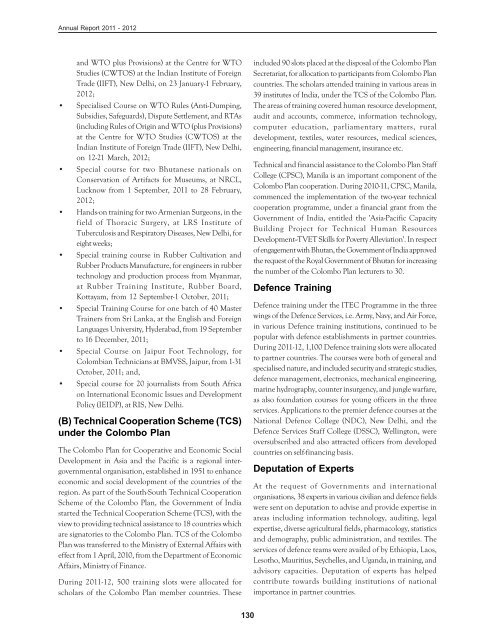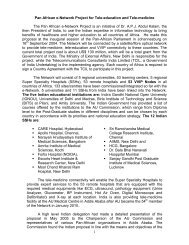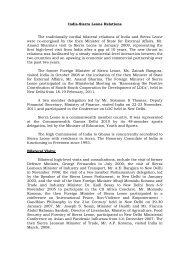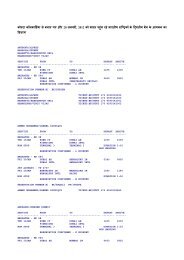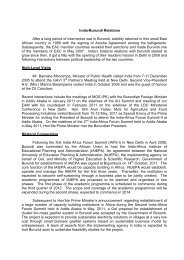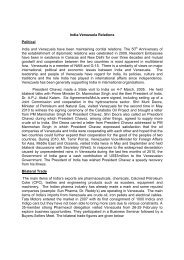Annual Report 2011 - 2012
Annual Report 2011 - 2012
Annual Report 2011 - 2012
Create successful ePaper yourself
Turn your PDF publications into a flip-book with our unique Google optimized e-Paper software.
<strong>Annual</strong> <strong>Report</strong> <strong>2011</strong> - <strong>2012</strong><br />
and WTO plus Provisions) at the Centre for WTO<br />
Studies (CWTOS) at the Indian Institute of Foreign<br />
Trade (IIFT), New Delhi, on 23 January-1 February,<br />
<strong>2012</strong>;<br />
• Specialised Course on WTO Rules (Anti-Dumping,<br />
Subsidies, Safeguards), Dispute Settlement, and RTAs<br />
(including Rules of Origin and WTO (plus Provisions)<br />
at the Centre for WTO Studies (CWTOS) at the<br />
Indian Institute of Foreign Trade (IIFT), New Delhi,<br />
on 12-21 March, <strong>2012</strong>;<br />
• Special course for two Bhutanese nationals on<br />
Conservation of Artifacts for Museums, at NRCL,<br />
Lucknow from 1 September, <strong>2011</strong> to 28 February,<br />
<strong>2012</strong>;<br />
• Hands-on training for two Armenian Surgeons, in the<br />
field of Thoracic Surgery, at LRS Institute of<br />
Tuberculosis and Respiratory Diseases, New Delhi, for<br />
eight weeks;<br />
• Special training course in Rubber Cultivation and<br />
Rubber Products Manufacture, for engineers in rubber<br />
technology and production process from Myanmar,<br />
at Rubber Training Institute, Rubber Board,<br />
Kottayam, from 12 September-1 October, <strong>2011</strong>;<br />
• Special Training Course for one batch of 40 Master<br />
Trainers from Sri Lanka, at the English and Foreign<br />
Languages University, Hyderabad, from 19 September<br />
to 16 December, <strong>2011</strong>;<br />
• Special Course on Jaipur Foot Technology, for<br />
Colombian Technicians at BMVSS, Jaipur, from 1-31<br />
October, <strong>2011</strong>; and,<br />
• Special course for 20 journalists from South Africa<br />
on International Economic Issues and Development<br />
Policy (IEIDP), at RIS, New Delhi.<br />
(B) Technical Cooperation Scheme (TCS)<br />
under the Colombo Plan<br />
The Colombo Plan for Cooperative and Economic Social<br />
Development in Asia and the Pacific is a regional intergovernmental<br />
organisation, established in 1951 to enhance<br />
economic and social development of the countries of the<br />
region. As part of the South-South Technical Cooperation<br />
Scheme of the Colombo Plan, the Government of India<br />
started the Technical Cooperation Scheme (TCS), with the<br />
view to providing technical assistance to 18 countries which<br />
are signatories to the Colombo Plan. TCS of the Colombo<br />
Plan was transferred to the Ministry of External Affairs with<br />
effect from 1 April, 2010, from the Department of Economic<br />
Affairs, Ministry of Finance.<br />
During <strong>2011</strong>-12, 500 training slots were allocated for<br />
scholars of the Colombo Plan member countries. These<br />
130<br />
included 90 slots placed at the disposal of the Colombo Plan<br />
Secretariat, for allocation to participants from Colombo Plan<br />
countries. The scholars attended training in various areas in<br />
39 institutes of India, under the TCS of the Colombo Plan.<br />
The areas of training covered human resource development,<br />
audit and accounts, commerce, information technology,<br />
computer education, parliamentary matters, rural<br />
development, textiles, water resources, medical sciences,<br />
engineering, financial management, insurance etc.<br />
Technical and financial assistance to the Colombo Plan Staff<br />
College (CPSC), Manila is an important component of the<br />
Colombo Plan cooperation. During 2010-11, CPSC, Manila,<br />
commenced the implementation of the two-year technical<br />
cooperation programme, under a financial grant from the<br />
Government of India, entitled the 'Asia-Pacific Capacity<br />
Building Project for Technical Human Resources<br />
Development--TVET Skills for Poverty Alleviation'. In respect<br />
of engagement with Bhutan, the Government of India approved<br />
the request of the Royal Government of Bhutan for increasing<br />
the number of the Colombo Plan lecturers to 30.<br />
Defence Training<br />
Defence training under the ITEC Programme in the three<br />
wings of the Defence Services, i.e. Army, Navy, and Air Force,<br />
in various Defence training institutions, continued to be<br />
popular with defence establishments in partner countries.<br />
During <strong>2011</strong>-12, 1,100 Defence training slots were allocated<br />
to partner countries. The courses were both of general and<br />
specialised nature, and included security and strategic studies,<br />
defence management, electronics, mechanical engineering,<br />
marine hydrography, counter insurgency, and jungle warfare,<br />
as also foundation courses for young officers in the three<br />
services. Applications to the premier defence courses at the<br />
National Defence College (NDC), New Delhi, and the<br />
Defence Services Staff College (DSSC), Wellington, were<br />
oversubscribed and also attracted officers from developed<br />
countries on self-financing basis.<br />
Deputation of Experts<br />
At the request of Governments and international<br />
organisations, 38 experts in various civilian and defence fields<br />
were sent on deputation to advise and provide expertise in<br />
areas including information technology, auditing, legal<br />
expertise, diverse agricultural fields, pharmacology, statistics<br />
and demography, public administration, and textiles. The<br />
services of defence teams were availed of by Ethiopia, Laos,<br />
Lesotho, Mauritius, Seychelles, and Uganda, in training, and<br />
advisory capacities. Deputation of experts has helped<br />
contribute towards building institutions of national<br />
importance in partner countries.


